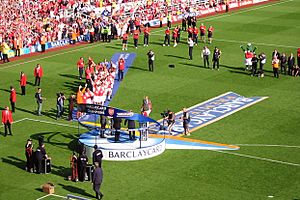History of Arsenal F.C. (1966–present) facts for kids
The history of Arsenal Football Club from 1966 until today covers some of the club's most successful times. During this period, Arsenal won three "Doubles" (winning the league and FA Cup in the same season), a "Cup Double" (winning two different cups in one season), and achieved success in European competitions. They even had an amazing season where they didn't lose a single league match!
After Bertie Mee became manager in 1966, Arsenal won their first European trophy, the Inter-Cities Fairs Cup, in 1969–70. Then, in 1970–71, they won their first League and FA Cup Double. However, the team changed, and the next ten years saw Arsenal often come close but not quite win. They lost three FA Cup finals and a European Cup Winners' Cup final on penalties. Their only big win during this time was the 1978–79 FA Cup against Manchester United.
The 1980s were a quieter time for the club. But when former player George Graham returned as manager in 1986, a new period of success began. Arsenal won the League Cup in 1986–87 and two League titles in 1988–89 and 1990–91. They also won the FA Cup and League Cup double in 1992–93 and another European trophy, the Cup Winners' Cup, in 1993–94. Graham left the club in 1995.
Arsenal's next big period of success started when Arsène Wenger became manager in 1996. Under him, Arsenal won another league and cup double in 1997–98, and then a third in 2001–02. They also won the FA Cups in 2002–03 and 2004–05. In 2003–04, they won the Premier League without losing a single match, earning the nickname "The Invincibles." In 2005–06, Arsenal became the first London club to reach the UEFA Champions League Final, but they lost to FC Barcelona. After this, they moved from their old home, Highbury, to the new Emirates Stadium. They then had a few years without winning trophies, but later won three FA Cups in four seasons.
Contents
- The First Double (1966–76)
- Four Cup Finals Under Neill (1976–80)
- A Period of Change (1980–86)
- The George Graham Years (1986–95)
- Bruce Rioch: A Short Stay (1995–96)
- Wenger's Arrival and Two Doubles (1996–2003)
- The "Invincibles" and a Champions League Final (2003–06)
- Move to the Emirates and Trophy Drought (2006–13)
- End of the Drought and Wenger's Departure (2013–18)
- Post-Wenger Years (Since 2018)
The First Double (1966–76)
After Billy Wright left in 1966, Arsenal chose their physiotherapist, Bertie Mee, as the new manager. This surprised many people, even Mee himself! With his assistant, Dave Sexton, Mee brought a more professional way of working to the club. He also encouraged young players from Arsenal's youth team, who had won the FA Youth Cup in 1966. Talented players like Charlie George, John Radford, and Ray Kennedy joined the main team.
Mee also added experienced players. Captain Frank McLintock led a strong defence, and Peter Storey played a tough defensive midfield role. The team showed promise early on, reaching two League Cup finals in a row, in 1968 and 1969. However, Arsenal lost both times. They lost 1–0 to Leeds United in 1968.
The second League Cup loss was a big surprise. Arsenal lost 3–1 to Third Division team Swindon Town. Many Arsenal players had the flu before the game. Arsenal only managed to get to extra time because of a late mistake by Swindon's goalkeeper. In extra time, Swindon scored twice more. Despite this, Arsenal finished fourth in the league that season, which meant they could play in Europe in 1969–70.
This led to Arsenal winning their first trophy in 17 years and their first European trophy: the 1969–70 Inter-Cities Fairs Cup. Arsenal beat Ajax in the semi-finals. Then, in the final against Anderlecht, Arsenal made an amazing comeback. They were losing 3-0 in the first game, but Ray Kennedy scored a late goal. In the second game at Highbury, Arsenal won 3–0, with goals from John Radford, Eddie Kelly, and Jon Sammels. This meant Arsenal won the trophy 4-3 overall!
That same season, Arsenal only finished 12th in the league, perhaps because they were focused on Europe. But the very next season, 1970–71, Arsenal made history. They became only the second club in the 20th century to win the FA Cup and League Double. This was Arsenal's first Double! After a strong start, a 5–0 loss to Stoke City in September made it seem like they were out of the title race. But Arsenal fought back and went on a great run, not losing in the league again until January.
As the season ended, Arsenal were in a close race with Leeds United. Arsenal needed to beat or draw 0–0 with their rivals Tottenham Hotspur at White Hart Lane on the last day to win the title. Ray Kennedy scored in the 87th minute to give Arsenal a 1–0 lead. Arsenal held on to win the title! Five days later, Arsenal played Liverpool in the FA Cup Final at Wembley. Liverpool scored first in extra time. But Eddie Kelly equalised, and then Charlie George scored the winning goal from the edge of the box. Arsenal won 2–1, completing their first Double!
The Double was a great moment, but the next few years were tough. Arsenal bought World Cup winner Alan Ball, but they started 1971–72 poorly. They finished fifth in the league. In the European Cup, they were knocked out by Johann Cruyff's Ajax. Arsenal also reached the FA Cup Final again, but lost 1–0 to Leeds United.
Arsenal finished second in the league in 1972–73. But soon, the Double-winning team started to change, and Mee struggled to build a new strong team. The club's performance got worse, finishing 16th and 17th in the next two seasons. Bertie Mee then resigned. Terry Neill, a former Arsenal player, became the new manager.
Four Cup Finals Under Neill (1976–80)
Arsenal started to improve under Terry Neill. This was partly thanks to the talented Irish player Liam Brady. Many Irish players were at Highbury, including Pat Rice, Frank Stapleton, and David O'Leary. Experienced players like Malcolm Macdonald also joined. Don Howe, who had been part of the Double-winning team, returned as a coach.
Arsenal couldn't win the league title against strong teams like Liverpool. But they did very well in the FA Cup. Arsenal reached three FA Cup finals in a row (1978, 1979, and 1980). They won only one of them, the 1979 final against Manchester United. Arsenal were leading 2–0 with goals from Brian Talbot and Frank Stapleton. But with five minutes left, United scored twice to make it 2–2. Just when it looked like the game would go to extra time, Alan Sunderland scored in the last seconds to give Arsenal a famous 3–2 win!
The next season, 1979–80, was a tough one. Arsenal played many matches and reached two cup finals, but didn't win either. They were expected to beat Second Division team West Ham United in the FA Cup final, but lost 1–0. They also reached the Cup Winners' Cup final against Valencia, after beating Juventus in the semi-finals. The final ended 0–0, and Arsenal lost on penalties.
A Period of Change (1980–86)
Liam Brady left Arsenal for Juventus in 1980, and the team went through a quieter period. They still finished in the top four in the early 1980s, but they weren't really challenging for the title. They also didn't do as well in the FA Cup, except in 1982–83 when they reached both cup semi-finals but lost to Manchester United. The team faced challenges, and Arsenal suffered some surprising cup defeats to lower-division teams. Terry Neill was sacked in December 1983.
Don Howe, Neill's assistant, took over as manager. But he also couldn't lead the team to a trophy. Arsenal finished sixth and seventh under him, but they didn't seriously challenge for the league title. They were also knocked out of the 1984–85 FA Cup by York City. Fans were becoming unhappy with the team's performances, and fewer people were coming to watch games. Don Howe resigned in March 1986.
The George Graham Years (1986–95)
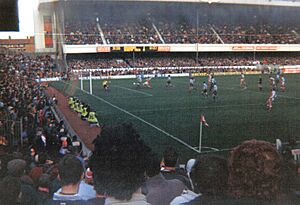
In May 1986, Millwall manager George Graham, who used to play for Arsenal, became the new manager. This started a new successful time at Highbury. Graham slowly changed the team, bringing in new players and promoting young talent. He also made the team much more disciplined. Arsenal's performance quickly got better, and they were at the top of the league by Christmas 1986.
New players like Lee Dixon, Nigel Winterburn, Steve Bould, David Rocastle, Alan Smith, Tony Adams, and Paul Merson became key parts of the team.
In Graham's first season, Arsenal finished fourth in the league. But they did win the League Cup! Arsenal had some amazing comebacks in this competition. In the semi-finals against Tottenham Hotspur, they were losing but scored late goals to win. In the final against Liverpool, Arsenal were 1–0 down, but two goals from Charlie Nicholas gave them their first League Cup trophy. This was Arsenal's first major trophy in eight years.
The next year, Arsenal lost the League Cup final to Luton Town. But their league form kept getting better. This was largely thanks to a strong defence made up of Lee Dixon, Nigel Winterburn, Steve Bould, and Tony Adams. This defence became famous and was a big part of Arsenal's success for many years. Graham's Arsenal team wasn't just about defence, though. They also had talented midfielders like David Rocastle, Michael Thomas, and Paul Merson. Striker Alan Smith scored many goals.
In Graham's third season (1988–89), Arsenal won their first League title since 1971 in a very exciting way. Arsenal had been leading the league since Christmas. But after losing to Derby County and drawing with Wimbledon, Liverpool overtook them. The final game of the season was against Liverpool at Anfield. Arsenal needed to win by two goals to take the title. Alan Smith scored for Arsenal early in the second half, making it 1–0. Time was running out, and Arsenal still needed another goal. But with only seconds left, Michael Thomas ran through the Liverpool defence and scored! This gave Arsenal the title!
Arsenal didn't win the title the next season, finishing fourth. They also didn't do well in the cups. Graham then signed goalkeeper David Seaman and Swedish winger Anders Limpar in 1990. These players were very important as Arsenal won the title again in 1990–91. Despite some challenges, Arsenal lost only one league match all season! They finished seven points ahead of Liverpool. They also reached the FA Cup semi-finals, but lost to Tottenham Hotspur.
In September 1991, Arsenal bought striker Ian Wright for a club record fee. Wright would become Arsenal's all-time leading goalscorer. The 1991–92 season was Arsenal's first time in the European Cup in 20 years, but they were knocked out early. They also lost to a lower-division team, Wrexham, in the FA Cup.
Graham then changed his team's style to be more defensive. They relied mainly on goals from Ian Wright. In 1992–93, Arsenal finished 10th in the first season of the FA Premier League, scoring fewer goals than any other team.
However, Arsenal did much better in the cups. In 1992–93, they became the first team to win both the FA Cup and the League Cup in the same season! In the League Cup final, Arsenal beat Sheffield Wednesday 2–1. In the FA Cup, Arsenal beat Spurs in the semi-finals. They then played Sheffield Wednesday again in the final. The game was 1–1 and went to a replay. Ian Wright scored for Arsenal, but Sheffield Wednesday equalised. In extra time, Andy Linighan scored a header in the very last minute to win the cup double for Arsenal!
In 1993–94, Arsenal won their second European trophy. They beat strong team Parma 1–0 in the Cup Winners' Cup final in Copenhagen. Alan Smith scored the winning goal. This was George Graham's last trophy at the club. The following February, Graham left the club.
Bruce Rioch: A Short Stay (1995–96)
Assistant manager Stewart Houston took charge until the end of the 1994–95 season. Arsenal finished 12th in the Premier League. However, they reached the Cup Winners' Cup final again. They faced Real Zaragoza in the final. The score was 1–1 and the game was heading for penalties. But in the very last minute of extra time, Nayim scored a goal from 40 yards out! Arsenal lost the final.
In June 1995, Arsenal appointed Bruce Rioch as manager. He bought Dutch striker Dennis Bergkamp for a club record fee. Bergkamp formed a great partnership with Ian Wright. Arsenal reached the League Cup semi-finals and finished fifth in the Premier League in 1995–96. This gave fans hope for a title challenge. But Rioch's time ended quickly. In August 1996, he left the club after a disagreement. Stewart Houston was in temporary charge again, followed by youth team coach Pat Rice, before Arsène Wenger arrived.
Wenger's Arrival and Two Doubles (1996–2003)
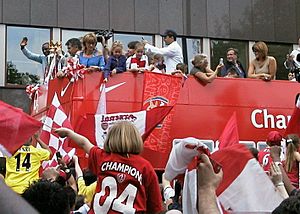
The team quickly improved under Wenger's management. They finished third in 1996–97. Wenger brought in many new French players who were not well-known in the UK, like Patrick Vieira, Nicolas Anelka, and Emmanuel Petit. He also signed Dutch winger Marc Overmars. Wenger mixed these new players with the experienced "old guard" like Adams, Dixon, and Winterburn. He also kept Pat Rice as his assistant.
Wenger won his first trophies the very next season, leading Arsenal to their second Double! It looked like Arsenal were out of the title race in December. But they came back from 12 points behind to overtake Manchester United. A 4–0 win over Everton on May 3rd won them the league title. On May 16th, Arsenal beat Newcastle United 2–0 in the FA Cup final to complete the Double. That same season, Ian Wright broke Cliff Bastin's goalscoring record for the club.
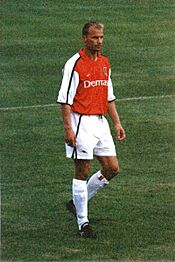
After signing Freddie Ljungberg in 1998 and Thierry Henry a year later, Arsenal had a few years without winning trophies, but they came very close. Arsenal led the league for much of 1998–99, but a loss to Leeds United allowed Manchester United to win the title. Arsenal also lost to Manchester United in the FA Cup semi-final replay. Arsenal's return to the Champions League was not successful, as they didn't get past the group stage.
Arsenal finished second again in 1999–2000, far behind Manchester United. They also had a poor Champions League season. This meant they played in the UEFA Cup, and they reached the final against Galatasaray in Copenhagen. The match was 0–0, and Arsenal lost on penalties.
Arsenal finished second again in 2000–01, behind Manchester United. Arsenal focused on the cups and Europe that season. They reached the FA Cup final against Liverpool. Arsenal were leading 1–0, but Liverpool scored two late goals to win 2–1. In Europe, Arsenal reached the Champions League quarter-finals for the first time since 1972, but were knocked out by Valencia.
By this time, Wenger had to rebuild much of the 1998 Double-winning team. Many players had left, and the famous defence was getting older. Wenger signed new defenders like Sol Campbell and Lauren, and promoted Ashley Cole from the youth team. In midfield, he added Robert Pires, and in attack, Sylvain Wiltord. Thierry Henry had also become one of the best strikers in the league.
Arsenal's attack was very strong as they won a record-equalling third Double in the 2001–02 season. Arsenal scored in every game of the Premier League season and didn't lose any away games. After a close title race, Arsenal won 13 games in a row, finishing seven points ahead of Liverpool. Arsenal won the title by beating Manchester United 1–0 at Old Trafford. The weekend before, Arsenal had won their eighth FA Cup, beating Chelsea 2–0.
In 2002–03, Arsenal became the first club in over 20 years to win the FA Cup two years in a row, beating Southampton 1–0. However, they just missed out on winning the Premier League title again. Arsenal had been eight points ahead of Manchester United, but their form dropped late in the season. They drew with Bolton and lost to Leeds United, which allowed United to win the title.
The "Invincibles" and a Champions League Final (2003–06)
The defeat to Leeds would be Arsenal's last in the league for over a year! The 2003–04 season was amazing for Arsenal. They won the Premier League without losing a single match (26 wins, 12 draws, 0 defeats)! They finished 11 points ahead of Chelsea. They were only the second team in English football history to do this. However, they were knocked out of the Champions League and FA Cup by Chelsea and Manchester United. Arsenal then recovered to beat Liverpool 4–2 in their next league match, with a hat-trick from Thierry Henry. They went on to win the league title with a 2–2 draw away to Tottenham Hotspur, just like in 1971.
Arsenal couldn't win the title again in 2004–05, finishing second behind Chelsea. However, they extended their unbeaten run to 49 matches, an English league record! This record was broken with a 3–0 win over Blackburn Rovers in August 2004. Their unbeaten run ended with a 2–0 loss to Manchester United. Arsenal still won their third FA Cup in four years, beating Manchester United on penalties after a 0–0 draw.
In 2005–06, Arsenal's league season was not as strong. They struggled with poor away form and were in danger of missing out on the Champions League for the first time since 1997. But they won their last three matches, including a 4–2 victory over Wigan Athletic in the very last match at Highbury. This, combined with Tottenham's loss, meant Arsenal finished fourth and secured a Champions League spot.
In Europe, Arsenal did much better in 2005–06. They reached the UEFA Champions League final for the first time in their history, becoming the first London club to do so! They finished top of their group without losing. In the knockout stages, they beat Real Madrid, Juventus, and then Villarreal. They set a competition record of ten matches without letting in a goal. In the final against Barcelona, Arsenal's goalkeeper Jens Lehmann was sent off early. But Arsenal still scored first, with Sol Campbell heading in a goal. Arsenal defended bravely, but Barcelona scored two late goals to win 2–1.
Move to the Emirates and Trophy Drought (2006–13)
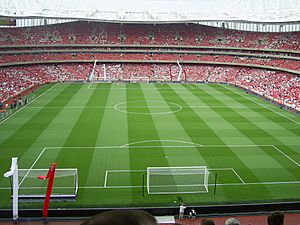
Arsenal had been very successful, but their old stadium, Highbury, was too small. In 1999, Arsenal announced plans to move to a new stadium nearby. Construction started in 2002, and in July 2006, the new Emirates Stadium opened.
Arsenal took some time to get used to their new home. Manager Arsène Wenger admitted that his team probably wouldn't challenge for the title that season. They finished fourth in the league. With a team mostly made up of younger players, they reached the League Cup Final, but lost 2–1 to Chelsea.
Moving to the Emirates also meant that many of the "Invincibles" players left, including Robert Pires, Dennis Bergkamp, and Thierry Henry. Arsene Wenger built a new, young team with players like Cesc Fabregas, Emmanuel Adebayor, and Theo Walcott. This young team made a strong challenge for the title in 2007–08, going unbeaten for 28 games and leading the league until February. But they finished third. The team made two more title challenges in 2010 and 2011, but their form dropped late in the season. They also reached the Champions League quarter-finals and semi-finals.
However, this young team didn't win a trophy. The closest they came was losing the League Cup final to Birmingham City in 2011. As a result, key players like Fabregas and Robin van Persie left. Arsenal then spent seasons fighting to finish in the top four instead of challenging for the title. They struggled to compete with the financial power of teams like Manchester United, Chelsea, and Manchester City. However, Arsenal still managed to finish in the top four of the league every season since 1996. In Europe, they were often knocked out in the last-16 stage of the Champions League.
End of the Drought and Wenger's Departure (2013–18)
Arsenal's nine-year wait for a trophy ended in 2014 when they won the FA Cup for the fifth time under Wenger. A new era began with the signing of German star Mesut Ozil from Real Madrid in 2013, breaking the club's transfer record. Arsenal started the league season well, leading the table until February, but again lost form and finished fourth. However, in the FA Cup, Arsenal reached the final. Despite going 2-0 down early to Hull City, they came back to win 3-2 and end their trophy drought!
Arsenal won the FA Cup again in 2015, beating Aston Villa 4-0. They had signed Chilean striker Alexis Sanchez from Barcelona that summer. In 2016, Arsenal achieved their highest league finish at the Emirates, coming second behind Leicester City.
In 2017, Arsenal won the FA Cup for a record thirteenth time, and a record seventh under Wenger. He became the most successful manager in the competition's history. However, they finished fifth in the league, missing out on the Champions League for the first time since 1996. In 2017–18, Arsenal reached the League Cup final, losing 3–0 to Manchester City. They also signed new players like Alexandre Lacazette and Pierre-Emerick Aubameyang, breaking their transfer record twice. Most importantly, Arsène Wenger announced he would leave after 22 years in charge. He was the club's longest-serving and most successful manager. A month later, Unai Emery became the new head coach.
Post-Wenger Years (Since 2018)
Unai Emery's time at Arsenal was short. He was sacked after 18 months. Arsenal had a good start to his first season, going unbeaten for 22 games. But they failed to return to the Champions League, finishing fifth in the league. In the Europa League, Arsenal reached the final, their first European final in 13 years, but lost 4–1 to Chelsea. A poor run of results the next season led to Emery leaving the club.
After a short time with former player Freddie Ljungberg as caretaker, Arsenal hired former club captain Mikel Arteta as head coach. Less than three months into Arteta's time, the season was stopped because of the COVID-19 pandemic. When the season restarted, all matches were played without fans. Arsenal finished a disappointing 8th in the league. But they won the FA Cup for a record 14th time! Pierre-Emerick Aubameyang scored twice in a 2–1 win over Chelsea in the final.
In 2020–21, Arsenal finished 8th in the league again. They were knocked out of the Europa League semi-finals. This meant they would not play in any European competition in 2021–22 for the first time since 1995–96. In April 2021, Arsenal was one of the clubs that tried to form a new European Super League, but they quickly pulled out after many people protested. In the 2021–22 season, Arsenal started at the bottom of the league in August. But they recovered and challenged for the top four spots. They finished fifth and were knocked out of both cup competitions in January.
In the next season, Arsenal started by winning all their games in August. They were top of the league when the World Cup began. Arsenal stayed at the top for most of the season. However, they only won four games in the last two months. This meant they finished second to Manchester City. They also lost to Manchester City in the FA Cup Fourth Round.
|
 | Emma Amos |
 | Edward Mitchell Bannister |
 | Larry D. Alexander |
 | Ernie Barnes |


